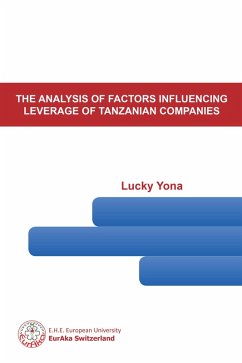The dominant capital structure studies across the globe have been concentrated in developed countries and specifically for listed companies and few on unlisted companies or mixed companies. This thesis aims to examine the extent to which company liquidity, profitability, tangibility, and company size influence the leverage of Tanzanian companies as suggested by pecking order and trade-off theory. The study findings show a negative relationship between company liquidity and company leverage as measured by debt ratio and debt-to-equity ratio. These findings show the validity of the pecking order theory in Tanzania. The postulates of the trade-off theory as far as liquidity is concerned are not valid. The study findings also reveal a positive relationship between profitability and leverage, suggesting that majority of Tanzanian companies used more debts as the means of financing their business operations despite their profitability. The study also found that the tangibility of listed companies was higher than that of the unlisted companies and that there was a negative relationship between tangibility and leverage, which is valid to pecking order but contrary to trade-off theory. As far as company size is concerned, study findings suggest that pecking order theory (POT) and trade-off theory (TOT) relevance cannot be fully supported in Tanzanian companies as the findings have revealed a negative relationship between company size and leverage. Findings reveal a negative relationship between company size and leverage. Pecking order theory (POT) and trade-off theory (TOT) relevance cannot be fully supported in Tanzanian companies, and size of listed companies was higher than that of the unlisted companies. This suggests that the size of majority of Tanzanian unlisted companies is still small as compared to the listed companies.
Dieser Download kann aus rechtlichen Gründen nur mit Rechnungsadresse in A, D ausgeliefert werden.









